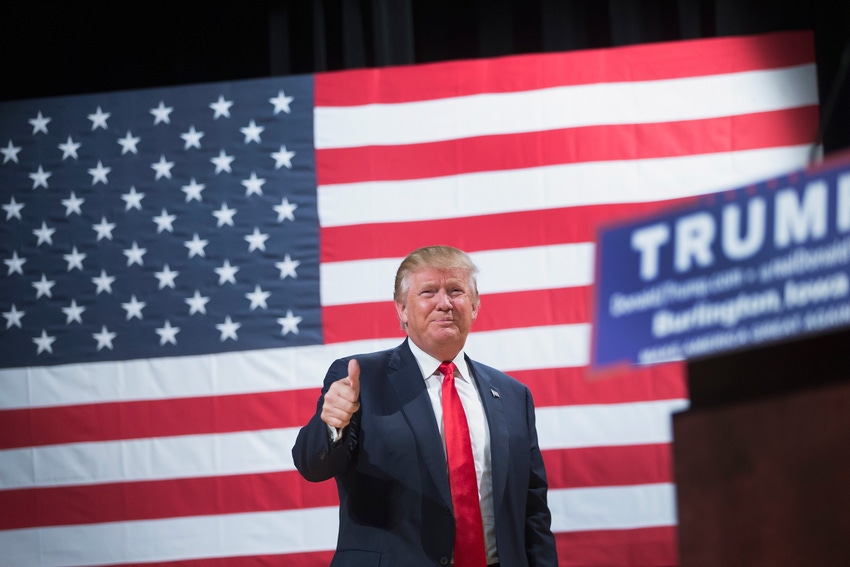Predicting what is next after the election is a task leading agriculture associations, including the National Pork Producers Council, are taking seriously.
November 7, 2016

 Election week is upon us. Although a record turn out has already voted, many Americans still remain undecided on the Election Day eve. On Wednesday, the election campaign nightmare will be over and no matter the outcome, the rush to accomplish something on Capitol Hill is on. Predicting what is next after the election is a task leading agriculture associations, including the National Pork Producers Council, are taking seriously.
Election week is upon us. Although a record turn out has already voted, many Americans still remain undecided on the Election Day eve. On Wednesday, the election campaign nightmare will be over and no matter the outcome, the rush to accomplish something on Capitol Hill is on. Predicting what is next after the election is a task leading agriculture associations, including the National Pork Producers Council, are taking seriously.
Following the election, Congress leadership election on Nov. 15 and the passage of the budget by Dec. 9 will influence the progress during the lame-duck session. The House and Senate have reached a deal on a bill to fund the government through Dec. 9. However, this bill’s expiration date will most likely foster last-minute deal making. Yet, the fall legislative session does leave time for other critical action important to the pork industry.
Removing trade barriers
Thanks to hardworking pork producers, like you, there is plenty of delicious pork for the entire world to enjoy. The good news is the world loves U.S. pork, but gaining access to global marketplaces is still an uphill battle. Eliminating trade barriers is the name of the game and the next play in the legislative playbook is passing the Trans-Pacific Partnership.
NPPC president, John Weber, explains America’s pig farmers are acutely aware of the necessity to gain market access around the world and the importance of trade agreements like TPP. He says, “They are all in and eager to supply delicious, safe pork to the global customer. I call it hidden optimism. They are not afraid to pull the trigger on expansion, thinking there will be better markets in the future.”
Currently, the approval of TPP by the U.S. Congress is in a holding pattern. As a legacy issue with the Obama administration, NPPC leadership anticipates a TPP vote in the lame-duck session. However, the presidential election impacted the free trade agreement dialog. Weber says, “We are going to keep beating that drum to the very end. In the last 30 days, we have tried to lift the bar and tell our Congressmen that we still want TPP. It is a good deal for agriculture and the U.S. economy.”
As a result of political pressure being placed on Congressmen to stay in line with their parties on this issue, lawmakers who usually support and lead the charge on trade are missing in action on TPP.
Unfortunately, Weber notes that the other 11 countries involved are waiting on the United States to pull the trigger on TPP. They are closely watching the United States.
“All 11 countries are pork-consuming countries in a big way. It is access to over a half billion new consumers. These economies are progressive and growing. You cannot just ignore that,” Weber further explains. “I personally do not think you can isolate yourself away from that type of market. I think it would be a financial disaster not only for your own personal operation, but for the country in general.”
Last week, NPPC reports, "Things are heating up on the Trans-Pacific Partnership Agreement — at least outside the halls of Congress." NPPC, along with other agriculture organizations, is asking its members to contact their congressional lawmakers to urge them to bring up and vote to pass the TPP before the end of the year.
Concerns over ‘GIPSA’ rules
In the rulemaking action, the USDA sent the Grain Inspection, Packers and Stockyards Administration rules to the White House Office of Management and Budget for review of three rules related to the buying and selling of livestock and poultry, reports NPPC. These rules include:
♦ An interim final rule addressing the “scope” of sections of the Packers and Stockyards Act related to meat packers using unfair, unjustly discriminatory or deceptive practices and giving undue or unreasonable preferences or advantages to producers.
♦ A proposed rule defining unfair practices and undue preferences.
♦ A proposed rule addressing poultry grower ranking systems.
NPPC is particularly concerned about the rule clarifying the scope of the PSA or “Farmers Fair Practices Rules.” USDA indicated in its letter to the organization that it would “establish our interpretation of the statute, which will then be entitled to judicial deference.” The fear is USDA’s interpretation will be that producers no longer will need to prove that a meat packer’s action injured or diminished competition in a marketplace. They only will need to show that practice was “unfair” or that an “undue” or “unreasonable” preference or advantage was given to another producer or producers. Moreover, this rule is marked final and will become effective as soon as it’s published in the Federal Register.
The leaders of the House Agriculture Subcommittee on Livestock and Foreign Agriculture, Congressmen David Rouzer (R-NC), chairman, and Jim Costa (D-CA), ranking member, expressed disappointment in the USDA’s decision to move forward on the “flawed” GIPSA rules, reports P. Scott Shearer in the Legislative Preview. Rouzer and Costa voiced the concern that the proposed rules will negatively impact how pork, cattle and poultry are marketed.
Hopefully, for all our sakes the remaining days of 2016 will be filled with less political pig wrestling and positive movements forward for the United States’ strongest industry — agriculture.
You May Also Like



